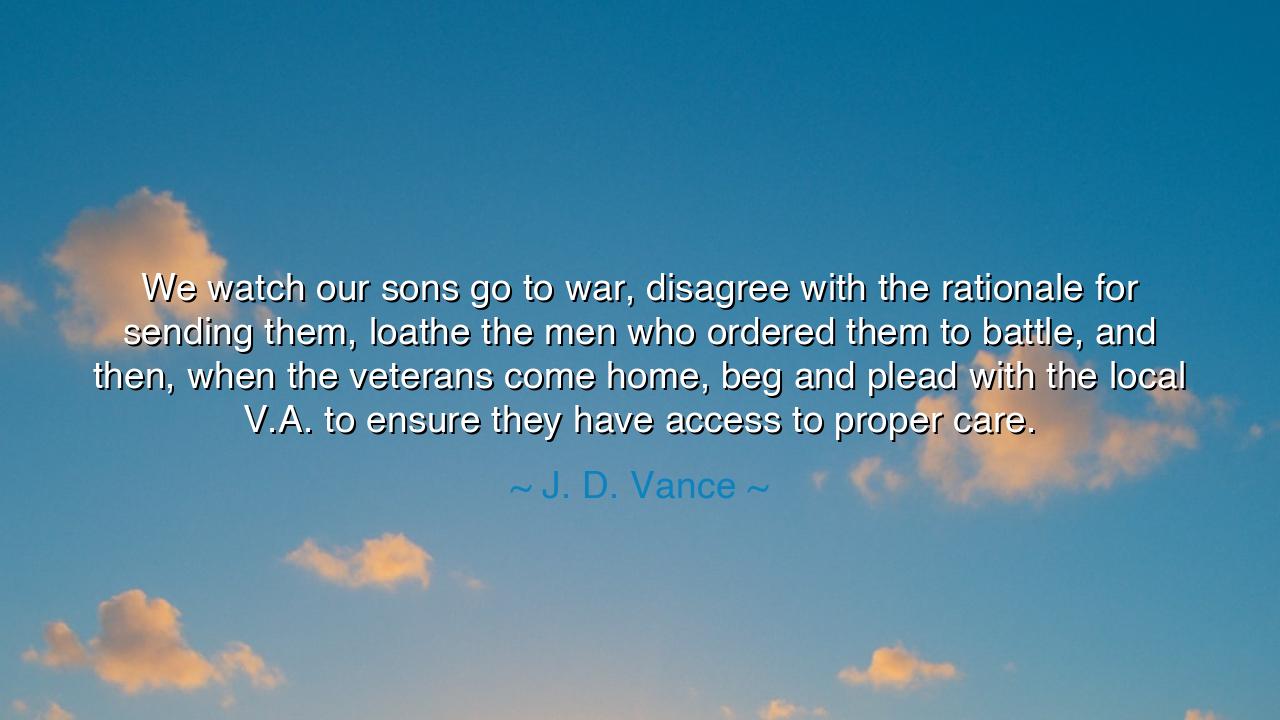
We watch our sons go to war, disagree with the rationale for
We watch our sons go to war, disagree with the rationale for sending them, loathe the men who ordered them to battle, and then, when the veterans come home, beg and plead with the local V.A. to ensure they have access to proper care.






The words of J. D. Vance are heavy with the sorrow of a nation that has forgotten the full cost of its own choices. “We watch our sons go to war, disagree with the rationale for sending them, loathe the men who ordered them to battle, and then, when the veterans come home, beg and plead with the local V.A. to ensure they have access to proper care.” These words are not merely a lament but a mirror — showing us a society divided between its ideals and its actions. Here, the author speaks not only of war, but of hypocrisy, of a people who reap the fruits of peace while disowning the labor and suffering that secure it.
In ancient times, the elder councils would weep as they sent their youth into the fires of battle. They did not do so lightly. For they knew that to command a man into war was to burden his soul forever. Yet in the modern age, the decision to send our sons to war has grown distant, abstract, wrapped in speeches and policies. We watch it unfold through the flicker of screens, and though our hearts rebel, our voices are small. We curse the leaders, loathe the men who order them to battle, yet we are bound by silence, until the soldiers return — broken in body or spirit — and then we wail for their healing, too late to undo the wound.
This quote springs from the deep soil of the American heart — from the story of a nation that has fought too many wars in too little time. From Vietnam to Iraq, mothers have waited by windows, fathers have clenched their jaws in pride and anguish, and neighbors have debated causes that seem to shift like sand. When the soldiers return, they are greeted with flags and music, but soon forgotten — left to navigate a system that stumbles under the weight of bureaucracy. The Veterans Affairs, symbol of gratitude and care, becomes instead a gatekeeper of suffering, where families beg and plead for the dignity their warriors have earned.
Consider the tale of Sergeant Thomas Young, who fought in Iraq, believing he was defending his homeland. A bullet severed his spine; his life changed forever. When he came home, he faced not the embrace of a grateful nation, but the cold indifference of institutions. He spoke out against the war he once fought for, and in his final years, became a voice of conscience for all soldiers betrayed by the distance between the sacrifice of the few and the apathy of the many. His story is the living echo of Vance’s lament — that a nation which sends its sons to war must also bear their pain without evasion or excuse.
In the heart of this quote lies the timeless struggle between idealism and accountability. It is easy to protest, to rage against the cause, to condemn the leaders. Yet when the soldiers return — weary, scarred, haunted — it is not protest but compassion that is required. We cannot separate the two. If we send men to war, or even if we stand silent while others do, then their fate becomes our responsibility. To abandon them afterward is to wound them a second time — not with weapons, but with neglect.
Therefore, let us learn this truth: the duty of a citizen does not end when the war is over. To honor the fallen is not enough; one must serve the living. This means raising your voice when wars are unjust, but also opening your heart when warriors return. Visit the hospitals, support the families, volunteer, speak with the forgotten. Do not let patriotism be a banner waved in victory and discarded in defeat. True loyalty is not to a government, nor to a cause, but to the human beings who bear its burden.
Let every generation remember: to send a man into battle is to bind yourself to his fate. His pain is your inheritance, his healing your task. If you disagree with the reasons for the war, do not abandon those who fought it — for they obeyed not out of greed, but out of duty. Treat them as sacred guests in the house of peace they helped to build.
So I say to you, children of the coming age: do not forget those who fought for the peace you inherit. Question your rulers with courage, but embrace your veterans with mercy. For if a people loses its compassion for those who bleed in its name, it loses not only its honor, but its soul. The true measure of a nation is not in the battles it wins, but in how it cares for those who bore the cost of its victory.






AAdministratorAdministrator
Welcome, honored guests. Please leave a comment, we will respond soon